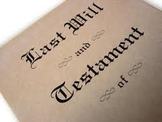Wills

One of the most common mistakes people make is not having a valid will. According to a study by Rutgers University in 2000, 70% of Americans die without one. If you die without a will (called "intestate"), state laws will govern how your estate is distributed. A will allows you to determine who gets your property, to appoint guardians for your minor children, and to pick someone you trust to oversee your estate as executor. Without a will a judge could decide who raises your children. And a will that makes your wishes clear can keep your loved ones from getting in disputes over your assets or possessions.

